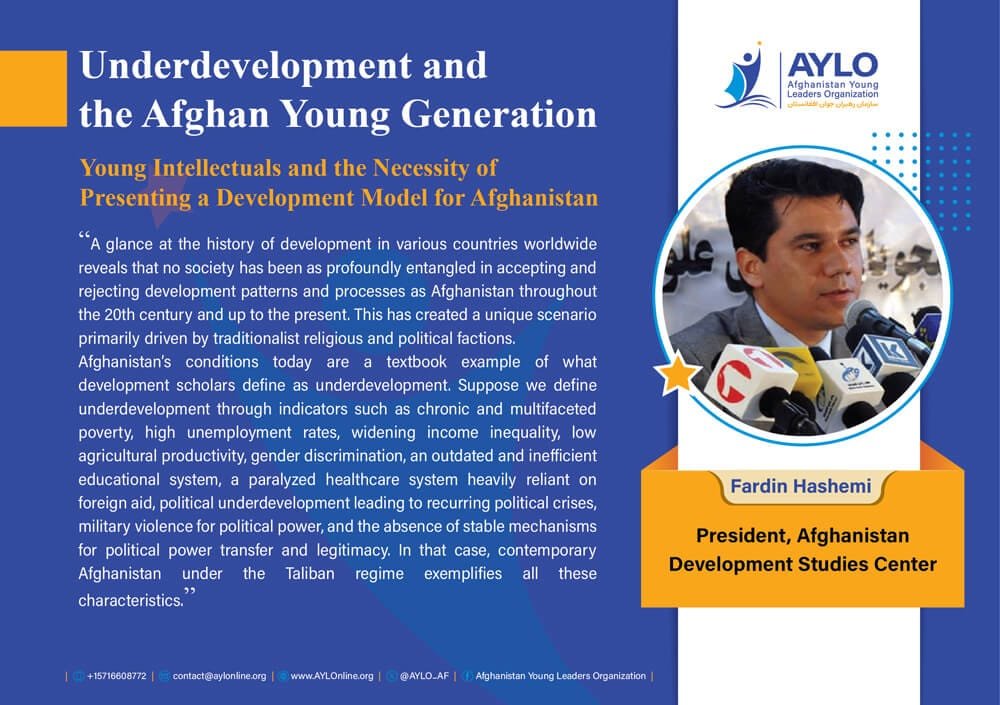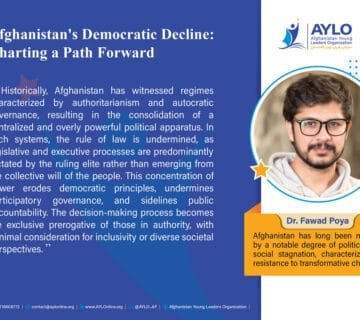Underdevelopment and the Afghan Young Generation:
Young Intellectuals and the Necessity of Presenting a Development Model for Afghanistan
A glance at the history of development in various countries worldwide reveals that no society has been as profoundly entangled in accepting and rejecting development patterns and processes as Afghanistan throughout the 20th century and up to the present. This has created a unique scenario primarily driven by traditionalist religious and political factions.
Afghanistan’s conditions today are a textbook example of what development scholars define as underdevelopment. Suppose we define underdevelopment through indicators such as chronic and multifaceted poverty, high unemployment rates, widening income inequality, low agricultural productivity, gender discrimination, an outdated and inefficient educational system, a paralyzed healthcare system heavily reliant on foreign aid, political underdevelopment leading to recurring political crises, military violence for political power, and the absence of stable mechanisms for political power transfer and legitimacy. In that case, contemporary Afghanistan under the Taliban regime exemplifies all these characteristics.
The central question this paper seeks to address is: Why, despite extensive and multifaceted efforts and investments over several decades—from King Amanullah Khan’s reforms in the 1920s, through relative stability and development in the 1960s (the decade of democracy), the communist coup and the Stalinist development model, and finally, international support (post-2001 aimed at rescuing Afghanistan from being a failed state)—does the country remain entrenched in underdevelopment?
In my view, the role of Afghanistan’s political elites and a significant portion of its intellectual class has been pivotal in perpetuating underdevelopment. Throughout the century many Afghan intellectuals advocated rigid adherence to Western modernization theories or communist utopian ideals without considering whether Afghanistan’s economic, social, political, and cultural structures aligned with these models.
In essence, most proposed development models followed a linear trajectory. For instance, Afghan communists in the 1970s and 1980s envisioned a feudal revolution based on Stalinist frameworks, completely mismatched with Afghanistan’s landlord-peasant societal structure. Marxist concepts such as class consciousness, which emerge organically from the conflict between workers and capitalists in capitalist societies, were artificially imposed on Afghanistan’s rural population. This mechanical interpretation of qualitative concepts like identity, which are socially constructed according to constructivist and Marxist perspectives, led to catastrophic consequences in the 1980s and 1990s—mistakes echoed in the fragmented intellectual discourse post-2001.
A parallel experience can be traced back to King Amanullah Khan’s reform attempts in the 1920s. Inspired by European modernization after his travels, he viewed it as a linear process, neglecting Afghanistan’s historical and socio-cultural contexts. Effective modernization should be a localized process rooted in an in-depth understanding of Western modernity’s foundations.
The failure to present a localized development model remains a significant shortcoming of Afghanistan’s intellectual community. This failure has inadvertently allowed primitive ideologies, such as those propagated by the Taliban, to dominate. Consequently, despite over a century of grappling with development, Afghanistan remains mired in underdevelopment—a result of both Taliban ideology and the intellectual community’s inability to propose a viable indigenous development framework.
Thus, the primary responsibility of Afghanistan’s new generation is to formulate a development model tailored to the country’s historical underdevelopment while aligning with global transformations and modern needs.
Achieving this requires a nuanced understanding of Afghanistan’s social complexities and the broader global modernization processes. Such an endeavor is undeniably monumental and decisive for Afghanistan’s future. It could serve the Afghan people’s interests in achieving sustainable development and mitigate the global security threats historically rooted in Afghanistan’s chronic underdevelopment.
Fardin Hashemi
President, Afghanistan Development Studies Center
Underdevelopment and the Afghan Young Generation



No comment